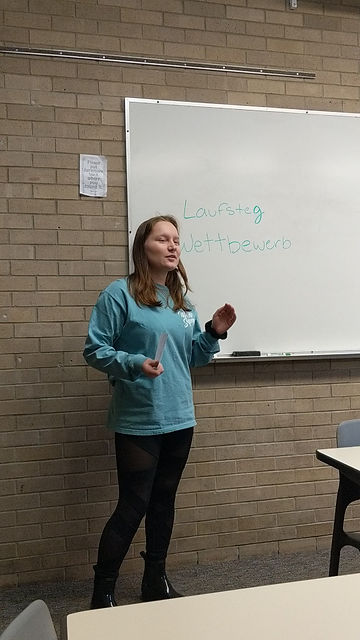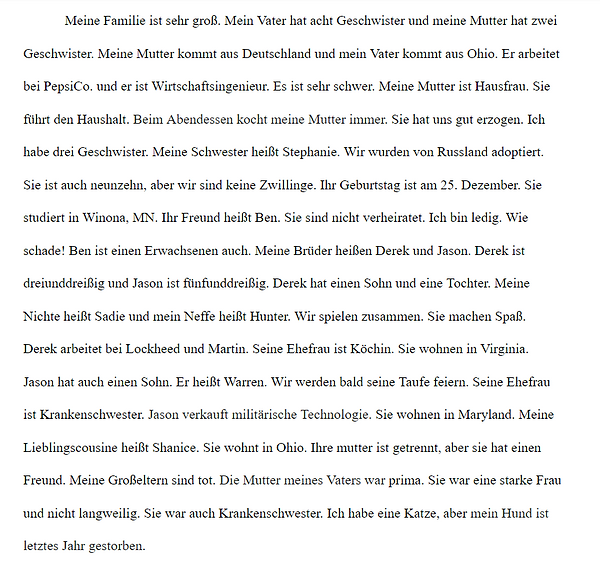top of page
Presentational Speaking
I’ve made a lot of progress since my first “My name is…” presentation, the place where all language students start. Now I can change around my word order, state my opinion, ask questions, and use descriptive words. I can also form sentences without having to prep for what I want to say, which I did by thinking in German as much as I can. For example, if I had a headache, I would think "Ow, Mein Kopf tut weh". My accent is slowly starting to improve as I do more listening exercises. I also like to just read random articles out loud to practice saying things at a natural pace. The independent study I am taking at Drake has had a large impact on this, as I have a lot more opportunities to talk with my professor. It has been difficult to remember simple, short phrases because I know those phrases in a variety of languages. Therefore, German isn't always the first one that comes to mind. Although, that isn't that big of an issue. I just need to get into my German mindset before speaking. I have found that German words, and the accent, don't come as naturally as some of the other languages I've studied.
The artifact I included below was a presentation on a German celebrity: Heidi Klum. Besides being informative, this presentation shows how my accent has progressed, and how I can speak about a topic without memorizing every sentence. I really enjoyed learning about a famous TV personality at the same time as practicing German.



Reading
In the beginning, understanding the vocab for reading was hard enough as it is, but trying to translate it accurately was difficult as well. When dealing with foreign languages, phrases can’t always be directly translated and some have many meanings. Now I have a much better grasp on narrowing down the meaning of a word and figuring out what the sentence is trying to say. In addition, translation is difficult because German has a different sentence structure. After working on the language for so long this has gotten much easier.
I can understand what the questions in the assignment book are asking now without having to translate anything.
Due to everything I have been reading, I think I have progressed the most in this area. I have begun to read short pieces in German such as the series to the left, Das Lesevergnügen bei Eli, and a few poetry books. I have a notebook where I write down any unfamiliar words from these books. I am also starting to read current event articles. German has a lot of long words that make up shorter, more common words. As I learn more of the shorter words, I can infer what the longer, technical terms mean. I hope that I can start reading politics pieces in German without having to translate most of it.
Listening/Interpersonal Speaking
After years of studying German it has gotten much easier to understand the accent. It's still a little difficult to switch between the dialects, but I do have experience with both. My mom always used a different accent than my teachers. Besides that, the main issue would be vocab, which has increasingly gotten better. This is especially true after I spend time writing out new vocab from my readings, watching German TV, and listening to German music. After trying to learn several languages, I have experienced that this is the most effective way of retaining the vocab. I can understand what people say at a relatively slow pace, but the natural, faster pace is still hard to follow. Although, overall, it takes me less time to translate the words in my head. Luckily, this is something that will get much easier if I am more immersed in the language, such as staying in Germany for an extended period. I plan to listen to podcasts to get used to hearing the language. That way I can get more used to the actual speaking pace.

To the right, I included a video of my classmate and I pretending to be a waitress and a customer. This is a good example of how we practiced talking back and forth in class. Both of us needed to be prepared for the various types of responses and questions that could be asked. Some other skits we did included giving directions and checking out at the grocery store.
Writing
Along with reading, writing is one of the categories I have improved the most in. After a while I got used to capitalizing nouns, using the umlaut, using the eszett, and figuring out how new words would be spelled. When I hear German speakers tell me a word to write, I can usually get the spelling correct. My general grammar has improved, along with sentence structure. I have also figured out German don't use the oxford comma.
I attached my most recent writing, where I worked on adjectives. I also included the prepositions I learned from the writing before this one. I think it's a good example of how I've progressed, and how I include what I learned in previous materials to new materials. The other piece I attached was during my first college semester of German, where we talked about our families. The sentence structure was very short and included very basic concepts. As I have mentioned before, I can still improve by working on my vocab and grammar. My sentence structure is still quite basic, and I still don't know the best ways of structuring a sentence to emphasize certain parts of the sentence. In addition, easy topics like the weather and the family are good for speaking, but not usually for writing. To get better at writing I need to be able to talk about more complicated topics like business or politics.
First Writing
.png)
Second Writing
.png)
bottom of page